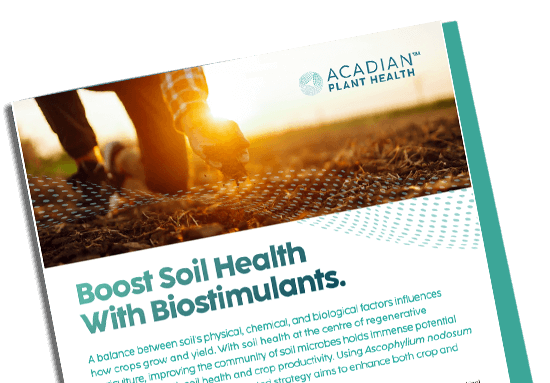
How Acadian Plant Health biostimulants boost crop productivity and soil health.
Growers have long known that a delicate balance between physical, chemical, and biological factors influences yield, how crops grow, and determines crop performance.
An ideal game plan for success starts with an integrated strategy to improve crop and soil management. Incorporating biostimulants in your crop management plan can boost soil health and increase the ability to grow healthy and productive crops.
The rundown on soil health.
Soil health is a measure of the capacity of soil to function as a vital living ecosystem, sustaining plants, animals, and humans. While soil health depends on multiple elements, the microbiome is a key element.
Microbiomes have immense potential to improve plant productivity. They aid in the plant's nutrient uptake and use as well as organic matter decomposition. Plant-microbe interactions and signalling molecules stimulate plant growth, increase resiliency to abiotic stress, and help root system development.
Roots play a crucial role in supporting plant health and yield. In fruits and vegetables, root systems affect yield and quality by as much as 30-50%.
More about soil microbes.
An important group of microbes within the rhizosphere are AMF (Arbuscular Mycorrhiza Fungi). In fact, AMF colonize more than 80% of land plants, including crops. These tiny helpers work symbiotically with the plant root to drive the composition of the rhizosphere.
AMF offers multiple benefits:
- Improves nutrient and water uptake
- Enhances biomass
- Increases stress tolerance and pathogen resistance
Growers who foster the relationship between roots, soil microbes (including AMF), and biostimulants will improve plant productivity, build crop quality, boost soil health, and get a leg up on their competition.
Soil microbes are a key player.
A healthy population of soil microbes performs many fundamental functions:
Aids in nutrient cycling
Betters soil structure by breaking down crop residue, which improves soil aggregation
Increases the soil's water-holding capacity
Stimulates plant growth
What happens when soil microbes team up with biostimulants?
A growing body of evidence indicates applications of alkaline-extracted Ascophyllum nodosum (ANE) biostimulants increase the biodiversity and activity of microbial communities in the rhizosphere. In turn, respiration and metabolic activity are increased.
A recent study published in Nature Scientific Reports titled Alkaline extraction of the seaweed Ascophyllum nodosum stimulates arbuscular mycorrhizal fungi and their endomycorrhization of plant roots found Acadian Plant Health's seaweed extract improved growth and symbiosis of AMF through multiple mechanisms.[1]
How do these compounds deliver benefits to plants and soil?
Build Soil Health
- Help build soil health by supporting the development and activity of soil microbial populations such as AMF, which support soil aggregation and improve soil structure.
- Promote carbon content in soil through the development of healthier soil and increased root biomass.
Enhance Nutrient Use Efficiency
- Improve nutrient uptake and nutrient use efficiency by increasing root growth and development.
- Stimulate rhizobia and increase nodulation.
Improve Water Use Efficiency
- Enhance water management within the plant and improve soil moisture.
Increase Abiotic Stress Mitigation
- Protect photosynthetic activity during abiotic stress and improve crop resiliency.
The path to victory.
Biostimulants can have a positive impact on your farm. Without soil health, there is no plant health. Adding APH biostimulants to your growing practices can unlock synergies to enhance this year's crop productivity, increase soil health, and lay the groundwork for future yields. Put APH biostimulants in your plan and see how we can help you create a strategy to reach peak performance.
